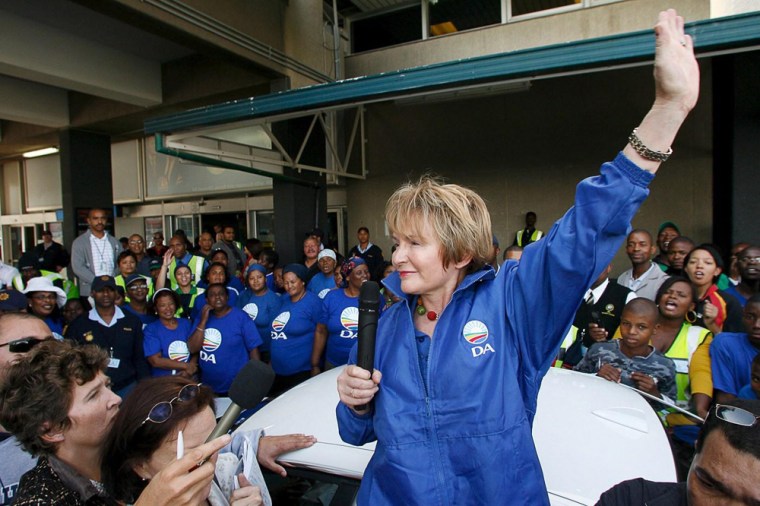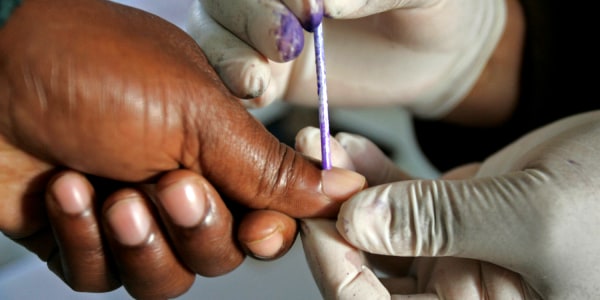South African elections results released Saturday show the African National Congress might have fallen short of winning its cherished two-thirds parliamentary majority. But the tally affirmed the ruling party's overall victory and set the stage for the controversial Jacob Zuma rise to the presidency.
The near-complete results also showed that the ANC lost power in the country's richest province because of hostility from mixed-race voters.
Zuma's supporters have been celebrating since shortly after the voting ended on Wednesday as his party's victory wasn't seriously in doubt.
The ANC views Zuma as the first leader who can energize voters since the legendary Nelson Mandela. But others say Zuma is too beholden to unions and leftists, and will not be able to fulfill his promises of creating jobs and a stronger social safety net. At the end of the campaign, Zuma was talking not about creating jobs, but staving off job losses.
His warmth and rise from poverty to political prominence have drawn adoring crowds throughout the election campaign, although critics question whether he can implement his populist agenda amid the global economic meltdown.
The nearly complete voting results show that more than 77 percent of the country's 23 million registered voters cast ballots. With 11.6 million votes counted, the ANC had 66.03 percent. That gives the ANC a clear parliamentary majority, but appears short of its goal of winning a two-thirds of the vote or 66.6 percent. The ANC needs to keep its two-thirds majority to enact major budgetary plans or legislation unchallenged, or to change the constitution.
However, the final number of seats in Parliament is based on a complicated formula and has yet to be determined.
In any case, Zuma is expected to be elected president when the new assembly votes in May.
While the ANC won the country, it lost power in South Africa's richest province because of hostility from mixed-race voters. In the fourth peaceful multiracial vote since the end of apartheid in 1994, the results in the Western Cape were a reminder that South Africa's racial divides still run deep.
The province is the heart of the country's wine and tourism industries, and also a region where mixed-race voters account for more than half the population while they are a small minority nationwide. They were treated better than blacks under apartheid's racist rules; now many feel marginalized and forgotten.
"I voted ANC at the first elections, but never again. Never, never. They don't look after us," voter Desmonia Goff said.
'Factional battles'
The largely white Democratic Alliance aggressively courted mixed-race voters ahead of Wednesday's vote and was close to gaining an outright majority in the provincial legislature there. The ANC had no hope of catching up, trailing with less than one-third of the vote, ahead of smaller opposition parties. It was a humiliating setback for the ruling party, which otherwise maintained its grip on power.
Zwelinzima Vavi, head of the national trade union movement and one of the ANC's most influential figures, said the Western Cape result was "disappointing but not surprising."
"The ANC (in the Western Cape) had been deeply hurt by infighting and factional battles that have run for five years," he said.
Parliament elects South Africa's president by a simple majority, putting ANC leader Zuma in line for president when the new assembly votes in May.
Flamboyant ANC leader
The ANC views Zuma as the first leader who can energize voters since the legendary Nelson Mandela, and Zuma has survived corruption and sex scandals that would have derailed a less wily populist. But with his all-but-official victory, Zuma takes on a heavy responsibility — meeting expectations for change among South Africa's impoverished black majority.
The ANC swept South Africa's first post-apartheid election in 1994 and the two following that. In 2004, it took 69.69 percent of the parliamentary vote.
If the ANC fails to at least match that this year, it will be seen as a message from voters that they want some limits on the party. A two-thirds majority allows the ANC to enact major budgetary plans or legislation unchallenged, or to change the constitution.
Democratic Alliance leader Helen Zille, who has won praise for her stint as mayor of Cape Town, said ahead of the elections that her main goals were to stop the ANC's two thirds majority and to win the Western Cape.

Hundreds of supporters — most of them mixed-race — greeted her when she returned to Cape Town Friday after monitoring election results in Pretoria. Even baggage handlers and security staff danced for joy. An airline passenger with an ANC T-shirt was loudly jeered.
"The Western Cape will set an example for the whole country, for democracy in South Africa," she told them in an impromptu thank you speech in the airport parking lot.
Mixed-race voters
Mixed race people — many of whom trace their ancestry back to Malay slaves — enjoyed more rights than blacks under apartheid's racist rules, and emerged skeptical of the ANC, which they see as a black party. The ANC, though, has support from some mixed race South Africans and whites across South Africa, and politicians from both groups have prominent roles in the party.
Those of mixed race origin make up about half the Western Cape's population, while black Africans comprise about 30 percent and whites about 18 percent. This is in contrast to the national picture, where blacks account for 80 percent of the population and mixed race and whites each for 9 percent.
Slideshow 12 photos
Elections held in South Africa
In a widely echoed complaint, salvage worker Herman Bailey said the ANC government had built roads and houses on a black settlement in the small coastal resort of Hout Bay, but wasn't interested in the dilapidated harbor area that is home to mixed-race people.
Unemployment in Hout Bay's harbor area is 60 percent and drug abuse is rampant.
Local ANC official Timothy Jacobs said the party was trying its best in the area but was hamstrung by a lack of resources to fight the challenges of poverty and to create sustainable jobs.
Zille successfully tapped into the discontent. She went on anti-drug marches in crime-infested suburbs, promised better housing and jobs, and convinced mixed race voters that she cared.
Thomas Lotts, a retired 70-year-old printer who lives in a rundown area just outside Cape Town, said he lived through British colonialism, apartheid and now multiracial democracy. But he said he had seen no improvement in his standard of living and was bleak about the future.
"British government, white government, black government," Lotts said in disgust as he contemplated another sweeping victory for the ANC nationwide. "And we will always be the last."
